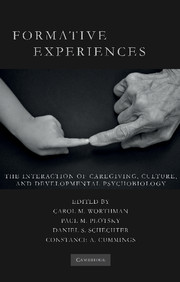Book contents
- Frontmatter
- Contents
- List of Figures
- List of Tables
- List of Contributors
- Foreword by Robert Sapolsky
- Preface
- List of Abbreviations
- Introduction
- SECTION ONE HISTORICAL, CROSS-CULTURAL, AND DEVELOPMENTAL SCIENCE PERSPECTIVES
- SECTION TWO HOW EXPERIENCE INTERACTS WITH BIOLOGICAL DEVELOPMENT
- SECTION THREE FORMATIVE RELATIONSHIPS WITHIN AND ACROSS GENERATIONS
- 7 Ethnographic Case Study: Bofi Foragers and Farmers – Case Studies on the Determinants of Parenting Behavior and Early Childhood Experiences
- Commentary
- Commentary
- 8 Clinical Case Study: Good Expectations – A Case Study of Perinatal Child-Parent Psychotherapy to Prevent the Intergenerational Transmission of Trauma
- Commentary
- Commentary
- 9 Ethological Case Study: Infant Abuse in Rhesus Macaques
- Commentary
- Commentary
- 10 Clinical Case Study: Multigenerational Ataques De Nervios in a Dominican American Family – A Form of Intergenerational Transmission of Violent Trauma?
- Commentary
- Commentary
- SECTION FOUR SOCIAL AND CULTURAL CONTEXTS OF CHILDHOOD DEVELOPMENT – NORMATIVE SETTINGS, PRACTICES, AND CONSEQUENCES
- SECTION FIVE FEAR, FUN, AND THE BOUNDARIES OF SOCIAL EXPERIENCE
- SECTION SIX PUBLIC HEALTH, EDUCATION, AND POLICY IMPLICATIONS
- Index
- References
Commentary
Published online by Cambridge University Press: 26 May 2010
- Frontmatter
- Contents
- List of Figures
- List of Tables
- List of Contributors
- Foreword by Robert Sapolsky
- Preface
- List of Abbreviations
- Introduction
- SECTION ONE HISTORICAL, CROSS-CULTURAL, AND DEVELOPMENTAL SCIENCE PERSPECTIVES
- SECTION TWO HOW EXPERIENCE INTERACTS WITH BIOLOGICAL DEVELOPMENT
- SECTION THREE FORMATIVE RELATIONSHIPS WITHIN AND ACROSS GENERATIONS
- 7 Ethnographic Case Study: Bofi Foragers and Farmers – Case Studies on the Determinants of Parenting Behavior and Early Childhood Experiences
- Commentary
- Commentary
- 8 Clinical Case Study: Good Expectations – A Case Study of Perinatal Child-Parent Psychotherapy to Prevent the Intergenerational Transmission of Trauma
- Commentary
- Commentary
- 9 Ethological Case Study: Infant Abuse in Rhesus Macaques
- Commentary
- Commentary
- 10 Clinical Case Study: Multigenerational Ataques De Nervios in a Dominican American Family – A Form of Intergenerational Transmission of Violent Trauma?
- Commentary
- Commentary
- SECTION FOUR SOCIAL AND CULTURAL CONTEXTS OF CHILDHOOD DEVELOPMENT – NORMATIVE SETTINGS, PRACTICES, AND CONSEQUENCES
- SECTION FIVE FEAR, FUN, AND THE BOUNDARIES OF SOCIAL EXPERIENCE
- SECTION SIX PUBLIC HEALTH, EDUCATION, AND POLICY IMPLICATIONS
- Index
- References
Summary
Developmental psychopathology is an integrative scientific discipline that strives to unify contributions from multiple fields of inquiry with the goal of understanding the mutual interplay between the study of normative adaptation and mental illness (Cicchetti, 2006). Whereas traditional viewpoints portray maladaptation and mental disorder as inherent to the individual, the developmental psychopathology framework places them in the dynamic relation between the individual and his/her internal and external contexts. An examination of the historical roots of the discipline of developmental psychopathology reveals that ethology and experimental and physiological psychology, three fields where scientists predominantly conduct their research with a variety of animal species, including monkeys, were seminal in its evolution into a mature science (Cicchetti, 1990). The influence of diverse disciplines on the field of developmental psychopathology illustrates the manner in which advances in our knowledge of the operation of developmental processes within particular scientific domains mutually inform each other. As such, the ethological case study on infant abuse in rhesus macaques, co-authored by M. Mar Sánchez, Kai McCormack, and Dario Maestripieri, addresses a highly significant topic in developmental psychopathology. Through their research on infant abuse, a naturally occurring problem in nonhuman primates, the authors make important contributions to understanding the etiology and developmental sequelae of human child maltreatment.
The notion of an average expectable environment for promoting development proposes that there are species-specific ranges of environmental conditions that elicit normative developmental processes.
- Type
- Chapter
- Information
- Formative ExperiencesThe Interaction of Caregiving, Culture, and Developmental Psychobiology, pp. 248 - 255Publisher: Cambridge University PressPrint publication year: 2010

